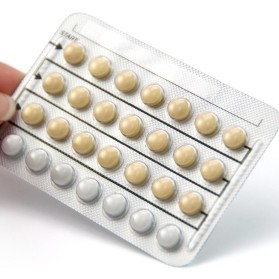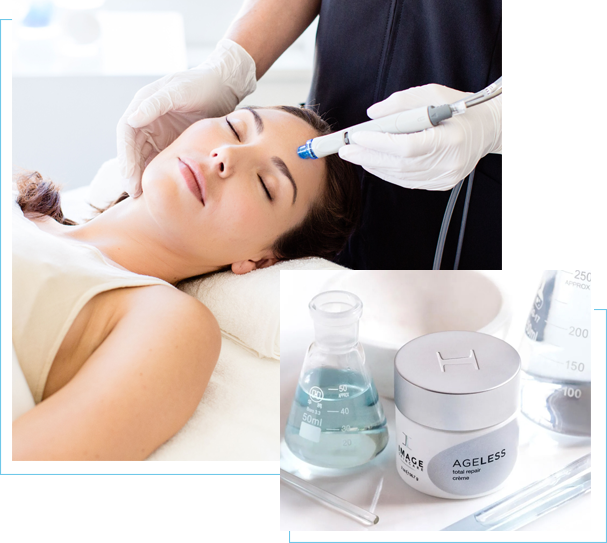
Hormonal Treatment for Acne
For many women, hormonal treatments may prove to be the cure for their acne. The ideal candidate for this type of treatment is a woman who has evidence of hormone-related acne, developed acne only as an adult, and/or has strong menstrual flares of acne. Hormonal treatments should also be considered for women who are just not responding to conventional acne treatments.
How do hormones cause acne?
The ovaries and adrenal glands make a variety of different hormones–mostly estrogen and progesterone-type hormones, but some androgens (more male type hormones like testosterone) are also produced. Androgens make oil glands in the skin enlarge and produce more oil. These oils are conducive to the growth of Proprionibacterium acnes, the main bacteria that is found in acne lesions.
What are some signs of hormonal acne?
- Acne lesions that tend to be focused on the lower part of the face, along the chin, jawline and neck
- Premenstrual flareups of acne
- Acne that doesn’t respond to typical treatments.
Does this mean I have too much testosterone?
The answer is almost always no. Most women with hormonal acne have testosterone levels that are perfectly normal. Instead, it seems that their skin is probably more sensitive to its effects.
Testing of hormone levels is unnecessary for the vast majority of women, but there are certain signs and symptoms that might make it worthwhile to get blood tests.
How does hormonal treatment help?
Hormonal treatments either reduce or block the effect of androgens. There are two major types of hormonal treatments available: estrogen therapy and spironolactone
Types of Hormonal Therapy
Estrogen Therapy
Estrogen therapy uses one of several specific medications that also function as birth control. They were all developed as birth control, but many women also noted that their acne cleared or became much better while on the medicines. With further study, several of these medicines became FDA approved specifically for the treatment of acne. These include Ortho-Tri-Cyclin, Yasmin, and Estrostep. They all contain two different hormones: an estrogen and a progestin. The estrogen in all of them is the same: ethinyl estradiol. However, the progestin is different. Ortho-Tri-Cyclin uses norgestimate, Yasmin uses drosperinone, and Estrostep uses norethindrone acetate.
It seems that there are about 100 other types of birth control pills out there and it does matter which one you are on. The key issues are how much estrogen there is and what type of progesterone is used.
Estrogen Amounts
These medicines help acne because of two primary effects, which both come from the estrogen. First, when taking these medicines, your ovaries will not need to make as much of these hormones any more, including testosterone. Estrogen also increases the production of sex-hormone binding globulin (SHBG), a protein made by the liver, that circulates in the blood. Testosterone in the blood gloms onto SHBG like a sponge and isn’t available anymore to mess with the oil glands in your skin.
So, for these medicines to work well for acne, they usually need to have a decent amount of estrogen. Progestin only pills don’t work at all for acne for this reason. Ultra low dose pills are also likely less effective. The sweet spot seems to be with 30-35 micrograms of estrogen.
There is also a concern that super low dose estrogen pills could be harmful for young women since estrogen is needed to form strong bones. The thought is that using the minimum amount of estrogen that it takes to suppress your ovaries could put you at a level of estrogen than is below the ideal amount for bone growth. This is critically important for young women where there is some data to support using at least 30 micrograms of estrogen in order to reduce the risk of osteoporosis later in life.
Progesterone Type
All of these medicines combine estrogen with progesterones called progestins. This hormone is necessary to prevent abnormal bleeding. There are numerous types of progestins in use:
- Norethynodrel
- Norethindrone
- Norethindrone acetate
- Norgestimate
- Desogestrel
- Ethynodiol diacetate
- Norgestrel
- Levonorgestrel
- Drospirenone
The issue with the progestins is that they can be adrnogenic themselves, which is probably part of the reason why some birth control pills fail to make acne better and might actually make it worse. The most androgenic progestins are Levonorgestrel and Desogestrel, while the least androgenic are Norethindrone, Drospirenone, and Norgestimate.
Starting Estrogen Therapy
Estrogen therapy takes time to work. For most women, you really won’t know how well it will work until after your 3rd cycle on the medicine. Because of this, I often will start women on an oral antibiotic at the same time because the antibiotic will work faster and can be stopped once the hormonal treatment is taking effect.
Spironolactone
The other tool for hormonal treatment is spironolactone. This medicine is used to treat blood pressure and low potassium, but has a side effect of blocking testosterone effects. It can have similar effects as estrogen therapy does on acne, but has a different set of side effects. It can be used alone or with estrogen therapy. It can be especially useful for women who should not take estrogen for some reason.
Other Benefits of Hormonal Theraapy
Many women will also find that they have less unwanted hair AND thicker hair on their scalp. Women using estrogen therapy often have more predictable, lighter, and less uncomfortable periods.
Birth Control Myths:
- You need to have a pap smear before starting on birth control. The American College of OB-GYN says this is absolutely not true. The need for a pap smear is based on sexual activity, not usage of birth control. If you are a sexually active woman, you should be getting pap smears at prescribed intervals regardless of whether you are on birth control. If you are using birth control for acne, but are not sexually active, a pap smear is not needed.
- Oral antibiotics will make birth control pills fail. This has only been shown for one antibiotic, rifampin, which is used mostly to treat tuberculosis. None of the antibiotics used for acne have any effect on birth control. Just remember, birth control isn’t perfect-it fails 1-3% of the time even with perfect use, and birth control doesn’t work during the first month.
- Birth control makes you gain weight. Large studies have shown that this is not the case.


